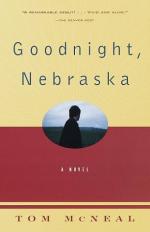|
This section contains 839 words (approx. 3 pages at 300 words per page) |

|
SOURCE: "Run to Daylighn," in New York Times on the Web, www.nytimes.com, May 3, 1998.
[In the following review of Goodnight, Nebraska, Mobilio focuses on McNeal's "meticulous rendition of the gritty reality of small-town life."]
Describing Great Plains communities that, "like weeds, spring up when it rains, dry up when it stops," Wright Morris once noted, "The withered towns are empty, but not uninhabited." This predicament—in which the landscape's sheer vastness overwhelms its residents—has always captivated American writers. In the hands of authors as varied as Willa Cather and Jane Smiley, the region's endless skies and vistas can seem as oppressive as the shadowy confines of a jail cell. Fitting squarely within this tradition, Tom McNeal's first novel, Goodnight, Nebraska, delivers us deep into that part of the heartland where just-plain-folks go quietly stir-crazy, even as they're cheerily waving "Howdy" from their pickup trucks.
For Randall...
|
This section contains 839 words (approx. 3 pages at 300 words per page) |

|


